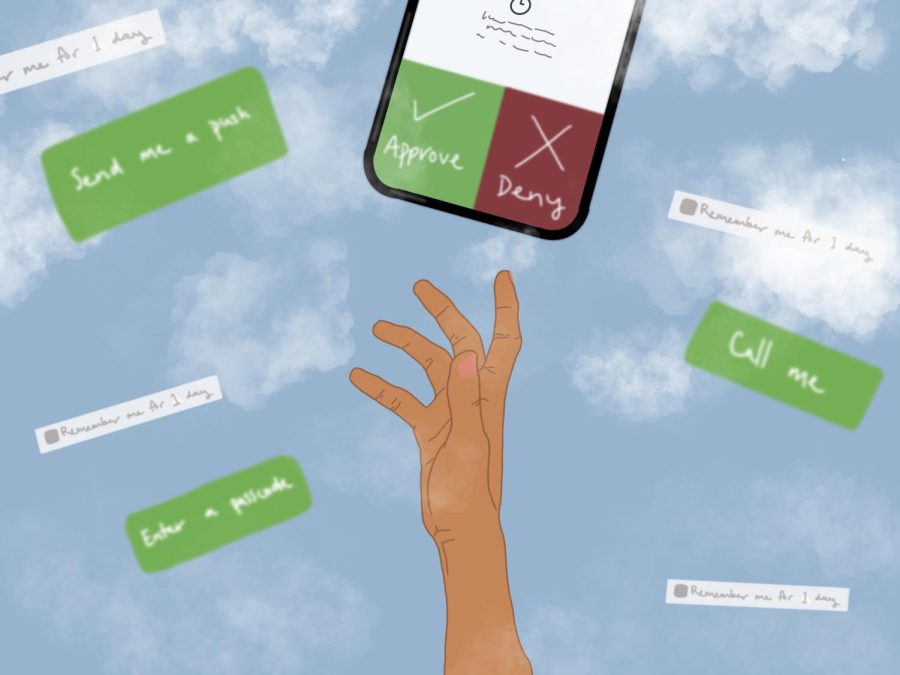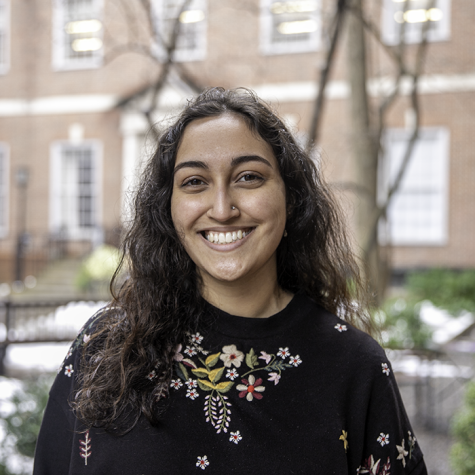Locked out: a multi-factor authentication nightmare
Every aspect of college life these days hinges on my phone. Guess what happened when I lost it?
Many NYU buildings and web services can only be accessed with multi-factor authentication, which requires a smartphone. Without one, you might be locked out. (Staff Illustration by Manasa Gudavalli)
January 28, 2022
Without fail, each spring semester, a handful of my senior friends make “last first day of school” Instagram posts. It was my turn this year — this week, actually. But while I’m generally a sentimental person, I didn’t want to assign the day too much value. COVID-19 has made me wary of putting too much weight on milestones, placing too much certainty on schedules. At the same time, the pandemic has made me more dependent on my classes — particularly in physical classrooms — for a routine, an excuse to leave my apartment, a way to socialize, a mental challenge and even a sense of purpose.
Though I hadn’t given it much thought, I was excited to return to campus this week. I’d be able to meet my peers, overanalyze where to sit — especially if pandemic rules mean permanent seat assignments — and find out whether my professor is nice. I wanted to make a good first impression and start the semester on the right foot.
Instead, my first impression to my professor was a pathetic email explaining that I couldn’t attend class because I had lost my phone.
The night before, I had taken a Lyft home from my friend’s apartment, and my phone slipped out of my pocket during the ride. I noticed as soon as I got inside, but it was too late. I frantically checked the street twice, turned my pockets inside out and emptied my tote bag before giving up for the night. There was nothing more I could do but console myself that, at the end of the day, I was safe and it was just a phone. I could live without it.
But, as it turns out, I couldn’t. At least not normally.
Though I miraculously woke up on time without an alarm — probably from anxiety — my stomach sank as I realized that without my phone, I could not complete NYU’s multi-factor authentication. Without MFA, I could not complete the Daily Screener. Without the Daily Screener, I was barred from campus.
My professor sympathized with my situation and excused my absence, instructing me to watch the recorded lecture on Brightspace to catch up. She was not offering a Zoom option for the time being, but it didn’t matter. Even asynchronously, I could not attend class remotely because logging into Brightspace requires — you guessed it — MFA. My hands were tied.
I was lucky to have my professor’s contact information in the first place; she had emailed us the syllabus a few days prior. If she had only uploaded it to Brightspace, which would have been perfectly reasonable, I may not have remembered her name, and I couldn’t have used Albert to check my schedule.
Missing my last first day of school was disappointing. COVID-19 has taken so much out of our control that an accident like this — the kind of stupid, preventable mistake that can happen to anyone — was deeply frustrating. I did nothing that day but watch TV in my apartment — no class meant no homework — yet I couldn’t relax. Was my phone gone forever? If so, would I be able to replace it before my next class? I kicked myself. Keeping track of my valuables was arguably the easiest thing in my life to manage, and I screwed it up.
I hated feeling helpless. I’d become a Gen Z stereotype overnight. I didn’t even miss my phone, but it suddenly became clear how much security it gives me as a young woman in New York. I was reluctant to leave my apartment at night or even take the subway during the day, just for something to do — what if something happened and I couldn’t call for help? I normally feel safe in the city, but these anxieties made me uneasy.
Worse, my roommate had not returned to the city. I had been living alone for a few days at this point, but for the first time, I truly felt alone. I couldn’t even call my mom to rant, which was my first instinct. I wandered to Dunkin’ for a pick-me-up when I should have been in class, not keeping track of time because, of course, I don’t have a wristwatch. The whole situation was disheartening.
What’s even scarier is that I got off easy. If my Lyft driver hadn’t returned my phone the next night, I wouldn’t have been able to access my course materials or study in Bobst with friends until I could replace it. I couldn’t go to work at my on-campus job, either. Thank goodness I live off-campus and don’t rely on a meal plan — I shudder to consider where that could leave a student. I had tripped into a crack in the system and gotten a glimpse of the abyss.
Until now, MFA was annoying. Sometimes, I’d do homework in one room while my phone was charging in another, and I’d grumble about having to get up from my work when logging into a site. This was an entirely different, darker story.
I used to find NYU’s layers of security superfluous but harmless. A student ID, Daily Screener and multi-factor authentication seemed like overkill, but I never doubted its contribution to my safety. Now, I wonder whether it’s actually more dangerous to weave such a precarious technological web. Does this system keep out more hackers or students?
I’ve completed half of my college career during a pandemic. My cell phone was the last thing I expected to disrupt my education or my life. It’s unsettling to know how easily MFA brought me down, but once reunited with my phone, there was nothing left to do but try to shake it off.
The night before my real first day of classes — everyone else’s second — I picked out an outfit and packed my bag. I allowed myself to care. I took my second chance at a first impression. And I triple-checked my pockets before stepping out the door.
Contact Sabrina Choudhary at [email protected].


























































































































































Copper • Jan 28, 2022 at 10:36 am
This is a really disturbing story. I am an alumni, and this wasn’t an issue when I was in school. It is scary to me that our lives are more and more dependent on having a smartphone, and this really brought into sharp focus how much can potentially go wrong when a phone is (so easily) lost. So glad you got yours back!